A positively charged rod is brought near to a non-conducting object. The rod is attracted to the object. From this observation. We can't predict whether the object is charged or uncharged. Some additional experments have been performed to identify whether the object is charged or uncharged, these experiments with their observations and conclusions drawn are given. Select the option in which conclusion drawn is correct.
A negatively charged rod is brought near to object and the two attract, this shows that the object is neutral.
A negatively charged rod is brought near to object and two repel, this shows that the object is negatively charged.
A neutral rod is brought near to object and two attract, this shows that the object is negatively charged.
All of the above
The correct Answer is:D
Step by step video & image solution for A positively charged rod is brought near to a non-conducting object. The rod is attracted to the object. From this observation. We can't predict whether the object is charged or uncharged. Some additional experments have been performed to identify whether the object is charged or uncharged, these experiments with their observations and conclusions drawn are given. Select the option in which conclusion drawn is correct. by Physics experts to help you in doubts & scoring excellent marks in Class 12 exams.
Updated on:21/07/2023Topper's Solved these Questions
- COULOMB LAW AND ELECTRIC FIELDBOOK - CENGAGE PHYSICS ENGLISHCHAPTER - COULOMB LAW AND ELECTRIC FIELDEXERCISE - Multiple Correct Answers Type
2 Videos
- COULOMB LAW AND ELECTRIC FIELDBOOK - CENGAGE PHYSICS ENGLISHCHAPTER - COULOMB LAW AND ELECTRIC FIELDEXERCISE - Comprehension Type
2 Videos
- COULOMB LAW AND ELECTRIC FIELDBOOK - CENGAGE PHYSICS ENGLISHCHAPTER - COULOMB LAW AND ELECTRIC FIELDEXERCISE - Integer
8 Videos
- CENGAGE PHYSICS DPPBOOK - CENGAGE PHYSICS ENGLISHCHAPTER - CENGAGE PHYSICS DPPEXERCISE - subjective type
51 Videos
- ELECTRIC CURRENT & CIRCUITSBOOK - CENGAGE PHYSICS ENGLISHCHAPTER - ELECTRIC CURRENT & CIRCUITSEXERCISE - Kirchhoff s law and simple circuits
15 Videos
Similar Questions
An electroscope is given a positive charge, causing its foil leaves to separate. When an object is brought near the top plate of the electroscope, the fiols separated even further. We conclude.
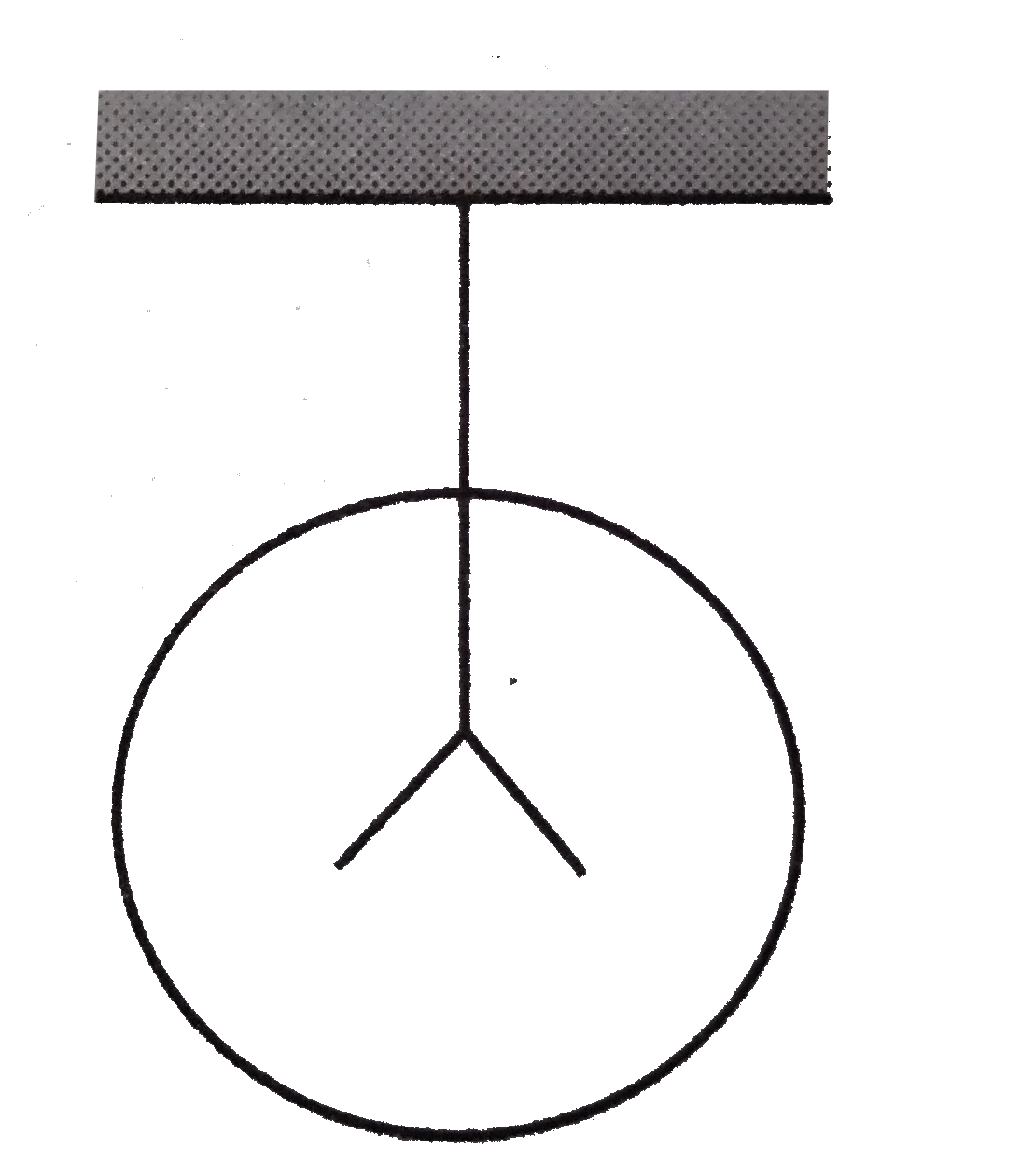
View SolutionA leaf electroscope is a simple apparatus to detect any charge on a body. It consist of two metal leaves OA and OB, free to rotate about O. Initially both are very slighty separted. When a charged object is touched to the metal knob at the top of the conduction re, charge flows from knob to the top of the conduction rod, charge flows from knob to the leaves through the conducting rod, charge flows from knob to the leaves through the conduction rod. As the leaves are now charged similarly, they start repelling each other and tet separted (deflected by certain angle).
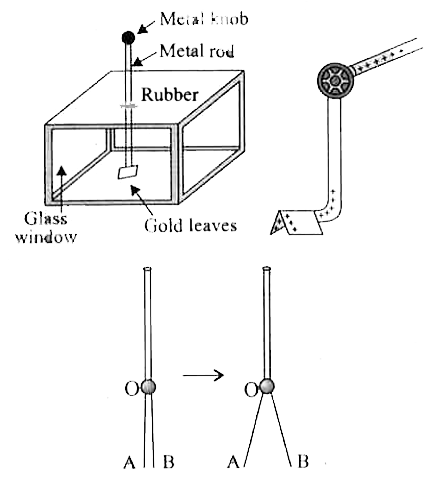
The angle of deflection in static equilibrium is an indicator of the amount of charge on the charged boy.
If we perform these steps one by one.
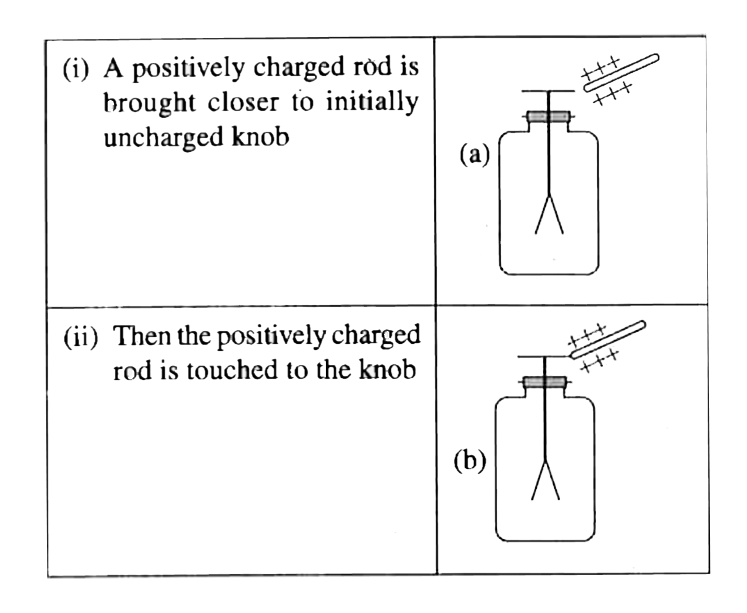
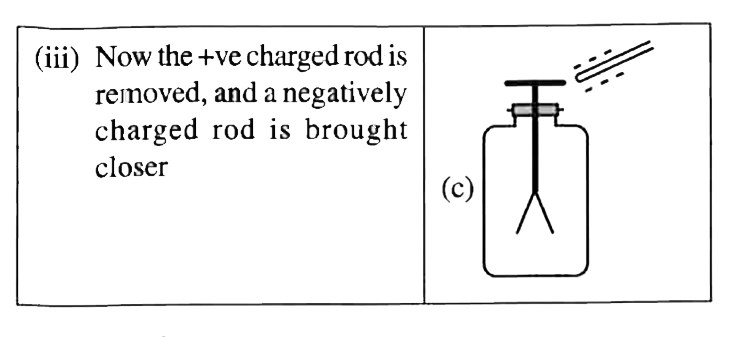
In which case, the leaves will converge (come closer), as compared to the previous state?
View Solution
Knowledge Check
Passage 1
The second section gives power to the President, "by and with the advice and consent of the Senate, to make treaties, provided two thirds of the Senators present concur…"
Some are displleased with it, not on account of any errors or defects in it, but because they say the treaties will have the force of laws, and thus should be made only by the legislature. These gentlemen seem not to consider that the judgement of our courts, and the commissions constitutionally given by our governor, are as valid and as binding on all persons whom they concern as the laws passed by our legislature. All constitutional acts of power, whether in the executive or in the judicial department, have as much legal validity and obligation as if they proceeded from the legislature. it surely does not follow that because the people have given the power of makin laws to the legislature, they should therefore likewise give the legislature the power to do every other act of government by which the citizens are to the bound and affected. The President is to have power, "by and with the advice and consent of the Senate, to make treaties, provided two thirds of the senators present concur."...
Though several writers o teh subject of government place the power of making treatis in the class of executive aunthorities, this is evidently an arbitrary classicication, for if we attend carefully to its operation, it will be found to partake more of the legislative than of the executive character, though it does not seem strictly to fall within the definition of either of them. The essence of teh legislative branch is to enact laws, or, in other words, to prescribe rules for the regulation of teh society, while the execution of the laws, and the employment of the common strength, either for this purpose of for the common defense, seem to comprise all the functions of the executive branch. The power of making treaties is, plainly, neither the one nor the other. It relates neither to the execution of the existing laws, nor to the creation of new ones, and still less to an exertion of the common strength. Its objects are CONTRACTS with foreign nations, which have the force of law, but derive it from the obligations of good faith. They are not rules prescribed by the government of the citizen, but agreements between two governments. The power in questin seems therefore to form a distinct department, and to belong, properly, neither to the legislative nor to the exective branch. The qualties elsewhere detailed as indispensable in the management of foreign negotiations point to the Exective as the best agent in those transactions, while the vast importance of the trust, and the operation of treaties as laws, plead strongly for the participation of the whole or a portion of the legislative body in the office of making them.
Based on Passage 2, it can be inferred that Hamilton would agree with which of the following statements ?AMost writers on the subject of government fail to provide evidence suffcient to support their conslusions.BCitizens should not be bound by agreements between one government and another.CAny power that is not properly described as judicial or legislative must be an executive power.DAt least some writers on the subject of government reach unsubstantiated conclusions about the scope of exective authority.Passage 1
The second section gives power to the President, "by and with the advice and consent of the Senate, to make treaties, provided two thirds of the Senators present concur…"
Some are displleased with it, not on account of any errors or defects in it, but because they say the treaties will have the force of laws, and thus should be made only by the legislature. These gentlemen seem not to consider that the judgement of our courts, and the commissions constitutionally given by our governor, are as valid and as binding on all persons whom they concern as the laws passed by our legislature. All constitutional acts of power, whether in the executive or in the judicial department, have as much legal validity and obligation as if they proceeded from the legislature. it surely does not follow that because the people have given the power of makin laws to the legislature, they should therefore likewise give the legislature the power to do every other act of government by which the citizens are to the bound and affected. The President is to have power, "by and with the advice and consent of the Senate, to make treaties, provided two thirds of the senators present concur."...
Though several writers o teh subject of government place the power of making treatis in the class of executive aunthorities, this is evidently an arbitrary classicication, for if we attend carefully to its operation, it will be found to partake more of the legislative than of the executive character, though it does not seem strictly to fall within the definition of either of them. The essence of teh legislative branch is to enact laws, or, in other words, to prescribe rules for the regulation of teh society, while the execution of the laws, and the employment of the common strength, either for this purpose of for the common defense, seem to comprise all the functions of the executive branch. The power of making treaties is, plainly, neither the one nor the other. It relates neither to the execution of the existing laws, nor to the creation of new ones, and still less to an exertion of the common strength. Its objects are CONTRACTS with foreign nations, which have the force of law, but derive it from the obligations of good faith. They are not rules prescribed by the government of the citizen, but agreements between two governments. The power in questin seems therefore to form a distinct department, and to belong, properly, neither to the legislative nor to the exective branch. The qualties elsewhere detailed as indispensable in the management of foreign negotiations point to the Exective as the best agent in those transactions, while the vast importance of the trust, and the operation of treaties as laws, plead strongly for the participation of the whole or a portion of the legislative body in the office of making them.
Which choice provides the best evidence for the answer to the previous question ?ALines 27-31 ("Though several…classification")BLines 36-39 ("The essence…society")CLines 48-51 ("Its objects…faith")DLines 60-64 ("While the …them")Passage 1
The second section gives power to the President, "by and with the advice and consent of the Senate, to make treaties, provided two thirds of the Senators present concur…"
Some are displleased with it, not on account of any errors or defects in it, but because they say the treaties will have the force of laws, and thus should be made only by the legislature. These gentlemen seem not to consider that the judgement of our courts, and the commissions constitutionally given by our governor, are as valid and as binding on all persons whom they concern as the laws passed by our legislature. All constitutional acts of power, whether in the executive or in the judicial department, have as much legal validity and obligation as if they proceeded from the legislature. it surely does not follow that because the people have given the power of makin laws to the legislature, they should therefore likewise give the legislature the power to do every other act of government by which the citizens are to the bound and affected. The President is to have power, "by and with the advice and consent of the Senate, to make treaties, provided two thirds of the senators present concur."...
Though several writers o teh subject of government place the power of making treatis in the class of executive aunthorities, this is evidently an arbitrary classicication, for if we attend carefully to its operation, it will be found to partake more of the legislative than of the executive character, though it does not seem strictly to fall within the definition of either of them. The essence of teh legislative branch is to enact laws, or, in other words, to prescribe rules for the regulation of teh society, while the execution of the laws, and the employment of the common strength, either for this purpose of for the common defense, seem to comprise all the functions of the executive branch. The power of making treaties is, plainly, neither the one nor the other. It relates neither to the execution of the existing laws, nor to the creation of new ones, and still less to an exertion of the common strength. Its objects are CONTRACTS with foreign nations, which have the force of law, but derive it from the obligations of good faith. They are not rules prescribed by the government of the citizen, but agreements between two governments. The power in questin seems therefore to form a distinct department, and to belong, properly, neither to the legislative nor to the exective branch. The qualties elsewhere detailed as indispensable in the management of foreign negotiations point to the Exective as the best agent in those transactions, while the vast importance of the trust, and the operation of treaties as laws, plead strongly for the participation of the whole or a portion of the legislative body in the office of making them.
Which choice provides the best evidence for the answer to the previous question ?ALines 5-6 ("Some are…legislature")BLines 9-14 ("These gentlemen…legislature")CLines 14-18 ("All constitutional…legislature")DLines 17-24 ("it surely…affected")
In one-dimensional kinematics, a particle can move strictly along a straight line. The description of motion of the particle can be done in two ways: (i) mathematical equation and (ii) graphs.
The choice of a particular method for solving a problem often depends upon the type and nature of problem, for example the graphical method provides more physical insight One dimensional motion is categorised into
1. motion with constant velocity
2. motion with constant acceleration, and
3. accelerated and de-accelerated motion
If you represent inotion (1) by the graph on position time and velocity-time coordinates, the graphs may look like as given below.
One very interesting case comes up, when a particle is thrown at a certain angle from the horizontal, the particle travels in the medium along a curved path, known as parabola. - The trajectory of the parabola written in the mathematical equation is given by
y=xtanθ−12gx2((v0cosθ))2
Ineglect resistance of medium and its motion where Vs and are the initial velocity of the projectile and the projection angle at the point of projection measured with the + x axis. There are some applications which we have seen in our life, like in many game shows, the theory of the projectile is always used An air gun is aimed at an elevated target, which is released in a free fall by some mechanism as the bullet leaves the nozzle. Irrespective of falling speed of object, the bullet will always hit the target.
QOut of the two methods, graphical method and mathematical equation, which gives you the better precision

View SolutionObserve the picture given below. Which one would be a negatively charged object and which one would be a positively charged object?

View SolutionThe existence of negatively charged particle in an atom was shown by J.J. Thomson as a result of the studies of the passage of electricity through gases at extremely low pressure known as discharge tube experiments. When a high voltage of the order of 10,000 volts or more was impressed across the electrodes, some sort of invisible rays moved from the negative electrode to the positive electrode these rays are called as cathode rays.
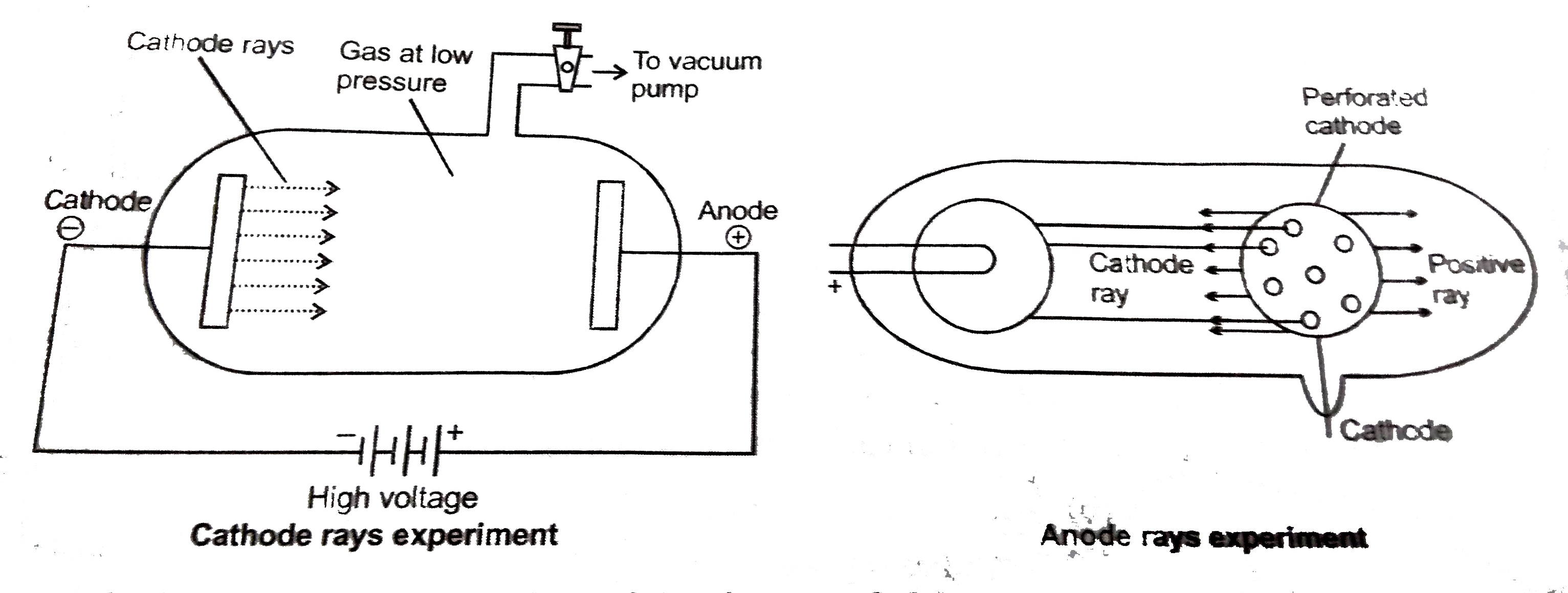
Cathode rays travel in straight path in absence of electrical and magnetic field . Cathode rays consist of material part and charged particles? Cathode rays produce X-rays and light is emitted when they strike on ZnS screen. Cathode rays penetrate through thin sheets of aluminium and other metals . They affect the photogenic plate and passes heating effect when they strike on metal foil. The raito of charge to mass i.e charge/mass is same for all the cathode rays irrespective of the gas used in the tube.
The existence of positively charged particle in an atom was shown be E. Goldstein. He repeated the same discharge tube experiments by using a perforated cathode. It was observed that when a high potential difference was applied between the electrodes, not only cathode rays were produced but also a new type of rays were produced simultaneoulsy from anode moving towards cathode and passes through the holes or canal of the cathode. These termed as canal rays or anode rays.
These rays travel in straight lines and consists of positively charged particles. These rays have kinetic energy and produces heating effect also. The e/m ratio of these rays is smaller than that of electrons. Unlike cathode rays, their e/m value is dependent upon the nature of the gas taken in the tube. These rays produced flashes of light on ZnS screen and can pass throughs thin metal foils. They can produce physical and chemical changes and are capable to produce ionisation in gases.
Select the incorrect statement.
View SolutionThe existence of negatively charged particle in an atom was shown by J.J. Thomson as a result of the studies of the passage of electricity through gases at extremely low pressure known as discharge tube experiments. When a high voltage of the order of 10,000 volts or more was impressed across the electrodes, some sort of invisible rays moved from the negative electrode to the positive electrode these rays are called as cathode rays.
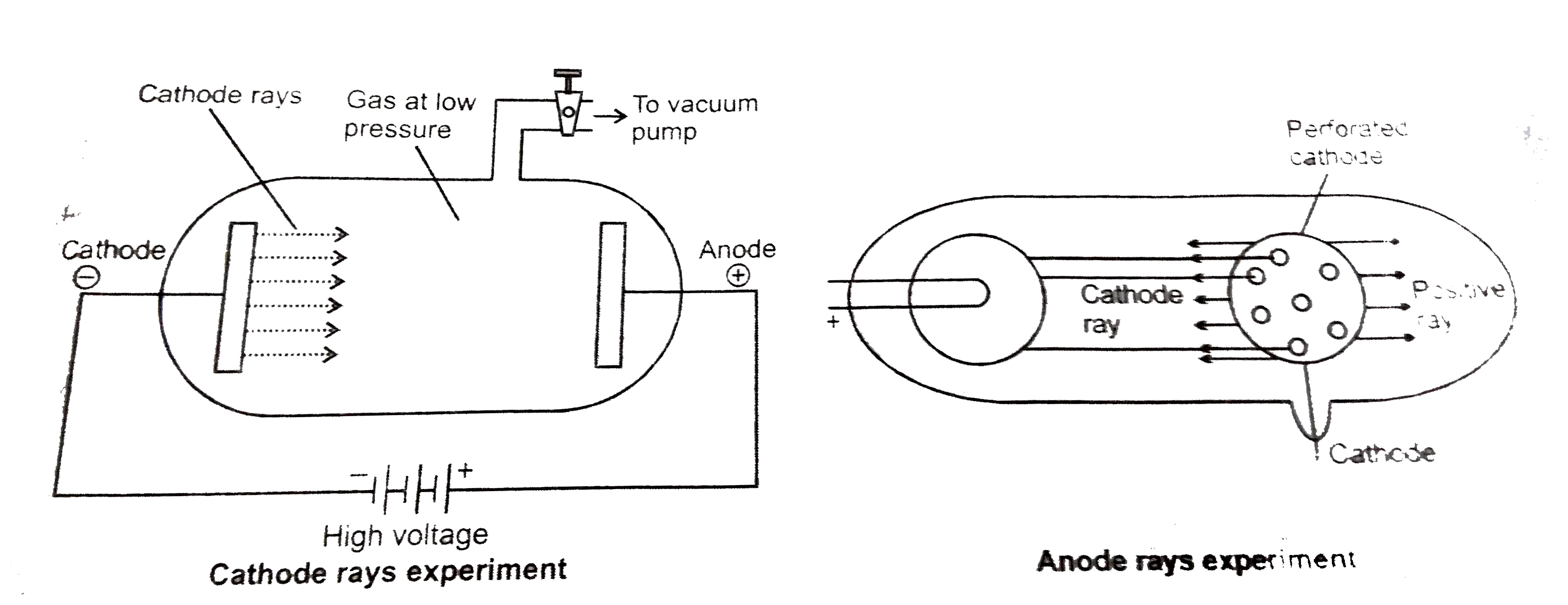
Cathode rays travel in straight path in absence of electrical and magnetic field . Cathode rays consist of material part and charged particles? Cathode rays produce X-rays and light is emitted when they strike on ZnS screen. Cathode rays penetrate through thin sheets of aluminium and other metals . They affect the photogenic plate and passes heating effect when they strike on metal foil. The raito of charge to mass i.e charge/mass is same for all the cathode rays irrespective of the gas used in the tube.
The existence of positively charged particle in an atom was shown be E. Goldstein. He repeated the same discharge tube experiments by using a perforated cathode. It was observed that when a high potential difference was applied between the electrodes, not only cathode rays were produced but also a new type of rays were produced simultaneoulsy from anode moving towards cathode and passes through the holes or canal of the cathode. These termed as canal rays or anode rays.
These rays travel in straight lines and consists of positively charged particles. These rays have kinetic energy and produces heating effect also. The e/m ratio of these rays is smaller than that of electrons. Unlike cathode rays, their e/m value is dependent upon the nature of the gas taken in the tube. These rays produced flashes of light on ZnS screen and can pass throughs thin metal foils. They can produce physical and chemical changes and are capable to produce ionisation in gases.
Which is not true with respect to cathode rays?
View SolutionPassage 1
The second section gives power to the President, "by and with the advice and consent of the Senate, to make treaties, provided two thirds of the Senators present concur…"
Some are displleased with it, not on account of any errors or defects in it, but because they say the treaties will have the force of laws, and thus should be made only by the legislature. These gentlemen seem not to consider that the judgement of our courts, and the commissions constitutionally given by our governor, are as valid and as binding on all persons whom they concern as the laws passed by our legislature. All constitutional acts of power, whether in the executive or in the judicial department, have as much legal validity and obligation as if they proceeded from the legislature. it surely does not follow that because the people have given the power of makin laws to the legislature, they should therefore likewise give the legislature the power to do every other act of government by which the citizens are to the bound and affected. The President is to have power, "by and with the advice and consent of the Senate, to make treaties, provided two thirds of the senators present concur."...
Though several writers o teh subject of government place the power of making treatis in the class of executive aunthorities, this is evidently an arbitrary classicication, for if we attend carefully to its operation, it will be found to partake more of the legislative than of the executive character, though it does not seem strictly to fall within the definition of either of them. The essence of teh legislative branch is to enact laws, or, in other words, to prescribe rules for the regulation of teh society, while the execution of the laws, and the employment of the common strength, either for this purpose of for the common defense, seem to comprise all the functions of the executive branch. The power of making treaties is, plainly, neither the one nor the other. It relates neither to the execution of the existing laws, nor to the creation of new ones, and still less to an exertion of the common strength. Its objects are CONTRACTS with foreign nations, which have the force of law, but derive it from the obligations of good faith. They are not rules prescribed by the government of the citizen, but agreements between two governments. The power in questin seems therefore to form a distinct department, and to belong, properly, neither to the legislative nor to the exective branch. The qualties elsewhere detailed as indispensable in the management of foreign negotiations point to the Exective as the best agent in those transactions, while the vast importance of the trust, and the operation of treaties as laws, plead strongly for the participation of the whole or a portion of the legislative body in the office of making them.
Which choice best states the relationship between the two passages ?
View Solution
